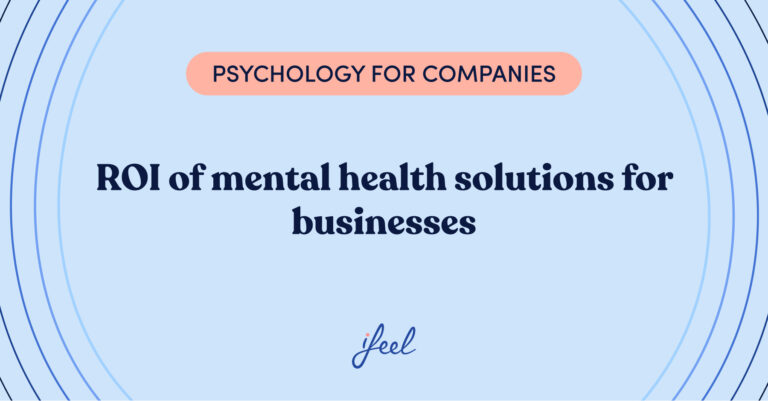Stress Awareness Month takes place in April every year. We celebrate this key date to raise awareness of stress’s effects on us and how we can tackle these using tools and resources. At ifeel, we believe mental health plays a crucial role in our lives both inside and outside the workplace. Keep reading to find out how to deal with work-related stress and what you can do during Stress Awareness Month to help your employees.
Do you know how to handle stress at work? Stress can take over the team and hinder productivity, so it is a must in any strategy to care for employees’ psychological well-being. However, not all companies know how to carry out systematic and efficient prevention and proper approach when it comes to learning how to handle stress at work. This is why implementing emotional well-being programs for companies, such as the one designed by ifeel’s team of psychologists, is so helpful.

Stress is the reaction of our organism when it perceives that the tasks it has to face exceed its resources. It is a natural response that allows us to adapt to the circumstances. However, when the stress response is too high and is prolonged in time beyond what is necessary, our body suffers a severe strain that can seriously damage our health.
Stress Awareness Month: spot the signs
When stress is left unaddressed in the workplace, it can lead to a decline in employee relationships. This can cause a decrease in motivation and commitment to the company, worsening the situation. Furthermore, chronic stress can take a toll on one’s physical and psychological health, resulting in fatigue, weakened immune function, impaired attention and memory, and feelings of anxiety and helplessness. If left untreated, prolonged stress can even result in employees needing to take mental health sick leave.
| Consequence | Impact |
|---|---|
| Decreased Productivity | Reduces efficiency and output of tasks. |
| Burnout | Leads to exhaustion, detachment, and reduced motivation. |
| Increased Absenteeism | Results in frequent absences, impacting workflow continuity. |
| Reduced Job Satisfaction | Diminishes overall contentment and engagement at work. |
| Lowered Morale | Damages team spirit and collective motivation. |
| Strained Relationships | Creates tension and conflicts among colleagues. |
| Health Issues | Triggers physical ailments like headaches, ulcers, etc. |
| Impaired Decision Making | Hampers the ability to make clear and rational choices. |
| Difficulty Concentrating | Hinders focus and attention, affecting task completion. |
| Higher Turnover Rates | Increases employee turnover, disrupting organisational stability. |
Mental health sick leave due to stress
There are many negative consequences for companies when employees take mental health sick leave. It can lead to reduced productivity and increased absenteeism since employees experiencing mental health issues may require time off work to get better. This, in turn, can result in a decrease in the company’s revenue and profitability.
Implementing a workplace well-being program, such as the one ifeel offers to its clients and partners, has become the backbone for organisations. It is an effective tool for prevention and addressing mental health issues.
It is important to note that returning to work after a mental health-related absence generally requires significant effort from both the employee and the company. Therefore, the abovementioned training, awareness-raising, and professional guidance can be especially beneficial. This is why it is critical to emphasise Stress Awareness Month amongst employees and raise awareness of mental health issues at work.
Identifying stress
There are a number of ways to identify stress. Ideally, this should be done with professional help and the right tools provided by a company. If you don’t know where to start, Stress Awareness Month can be a good start to open a conversation with your employees about stress. You can also download our resource on How to identify work-related stress for free. This guide will help you approach stress in a number of ways. It includes:
- A survey to determine if your team’s stress level is higher than it should be
- Ways to prevent work-related stress
- How to deal with stress at work
Thanks to this guide, you will learn the most important information about stress and why it is essential to prevent it to take care of your mental well-being at work.
How can we handle stress at work?
There are many strategies and techniques that can help tackle stress at work. Here are some guidelines to implement in your daily life.
1. Identify the root cause
Determine what is causing stress, such as excessive workload, deadlines, or interpersonal conflicts. By identifying the source of stress, you can take steps to address it directly.
2. Breaks at work
Take care of yourself both physically and mentally by getting enough sleep, eating well, and exercising regularly. If you work remotely, make sure you take proper breaks by leaving the house, taking a walk, and separating your home office from your bedroom/living room. If you work on-site, you should also take regular breaks. It is good to socialise with colleagues, go for a walk outside, or stretch your legs once in a while. This will help prevent burnout, boost creativity, and clear your mind.
3. Prioritise tasks
Break down your tasks into minor, manageable actions and prioritise them based on importance. This can help you feel more organised and less overwhelmed. When you prioritise your tasks, you focus your energy and attention on the most important and urgent tasks first. This helps you complete them efficiently and effectively, leading to a sense of accomplishment and increased productivity.

4. Work-life balance
Creating a clear separation between work and personal life reduces stress. It is essential to set clear boundaries between these two areas and avoid letting work spill over into your personal life. One way to do this is by establishing regular working hours and sticking to them as much as possible. Try switching off from work-related tasks and focusing on personal activities when not working.
5. Implement a mental well-being program
Tackling stress once it has emerged is difficult. However, if companies implement an emotional well-being program from the beginning, they can prevent mental health issues from arising in the first place. By prioritising employee well-being, companies can also demonstrate their commitment to their employees’ mental health, which can improve their reputation as an employer and attract top talent.
Supporting mental well-being in organisations
At ifeel, we know that preventing stress from emerging in the first place is the key for a healthy workforce. To support companies in this process, our team of expert workplace well-being psychologists has created a mental well-being solution for businesses that improves talent retention, reduces presenteeism, and combats employee stress.
With our mental well-being solution, your company’s HR managers can receive personalised, data-driven advice on improving mental health at work. In addition, this solution offers employees a 360° mental well-being service structured at different levels according to their needs. Try our solution now to see how it could help you.
We hope you found this article about Stress Awareness Month interesting. If you would like more information about our mental well-being solution for companies, simply request it, and we will contact your team as soon as possible.











